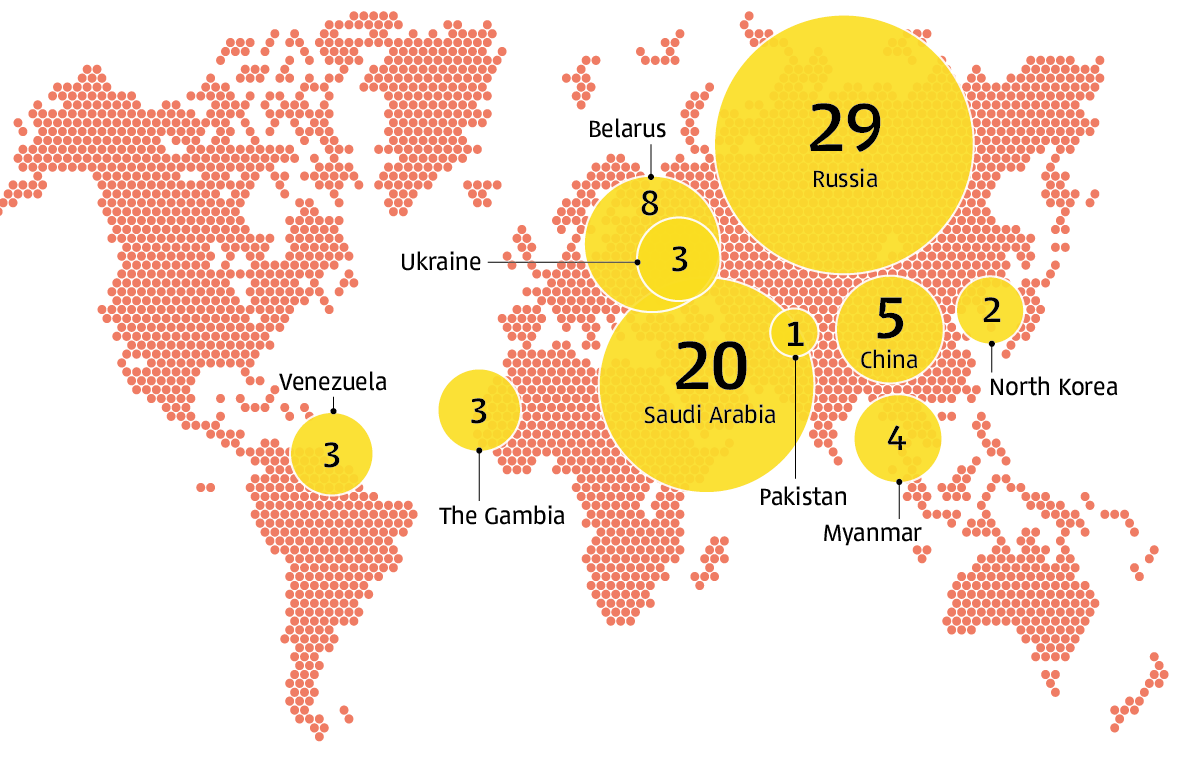
Year One in Numbers: UK Global Human Rights Sanctions
As the UK’s human rights sanctions programme marks its first anniversary, how has the Government used its new powers? Who has been sanctioned, where, and why?
By Charlie Loudon, International Legal Adviser, and Celeste Kmiotek, Legal Fellow
Launched with fanfare one year ago on 6 July 2020, the UK’s Global Human Rights Sanctions regime gave the Foreign Secretary the ability to sanction persons implicated in human rights abuses anywhere across the globe. Announcing the programme, Dominic Raab asserted, “This is a demonstration of Global Britain’s commitment to acting as a force for good in the world.”
Often referred to as ‘Magnitsky sanctions’, in honour of Russian whistle-blower Sergei Magnitsky, the sanctions impose asset freezes and travel bans on individuals and entities involved in torture, forced labour, or violations of the right to life. The UK’s regime follows similar programmes enacted by the US and Canada in recent years. A separate UK Global Anti-Corruption Sanctions regime followed in April 2021.
The first anniversary of the UK Global Human Rights Sanctions regime provides an opportunity to examine how the Government has used its new tool for tackling human rights abuses, as detailed in this paper.
A data-driven analysis shows 78 designations arising from 11 situations of human rights violations. There was a notable skew towards designations for violations of the right to life and prohibition on torture, with fewer designations for forced labour. Six entities were sanctioned, including military holding companies and public security bureaus. Individuals designated ranged from politicians and military officials to family members of perpetrators and prison doctors.
How many designations were made?
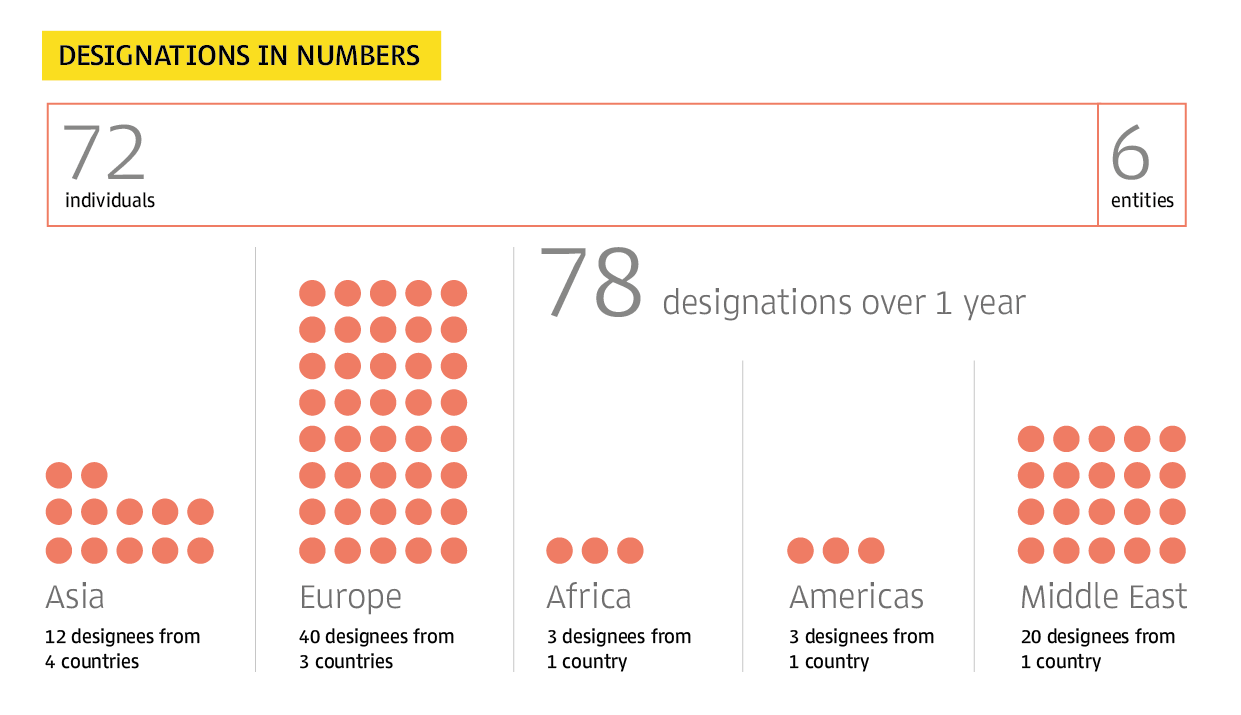
The UK Foreign Commonwealth & Development Office (FCDO) launched the regime on 6 July 2020 with 49 designations. In the remainder of the year, it made another 29 designations in 6 different tranches, for a total of 78 designations, averaging 6.5 designations per month. This may not, however, indicate the likely rate of future designations. In its initial 49 designations on launch, the UK regime was making up for lost time, sanctioning persons that had largely already been sanctioned by the US. A more useful figure may be the rate of UK designations when the initial tranche is discounted: an average of 2.4 per month. By way comparison, as of 5 July 2021 the US Global Magnitsky regime had 116 active human rights designations under its parallel regime, which had its first designations on 21 December 2017, averaging 2.8 designations per month.
Of the UK’s designations, 72 were individuals and 6 were entities. More details about the individuals designated are below. Of the entities, two are state security bureaus in North Korea, one is a special police unit in Russia, one is a public security bureau in China, and two are military holding companies in Myanmar.
Which countries and situations were represented in the designations?
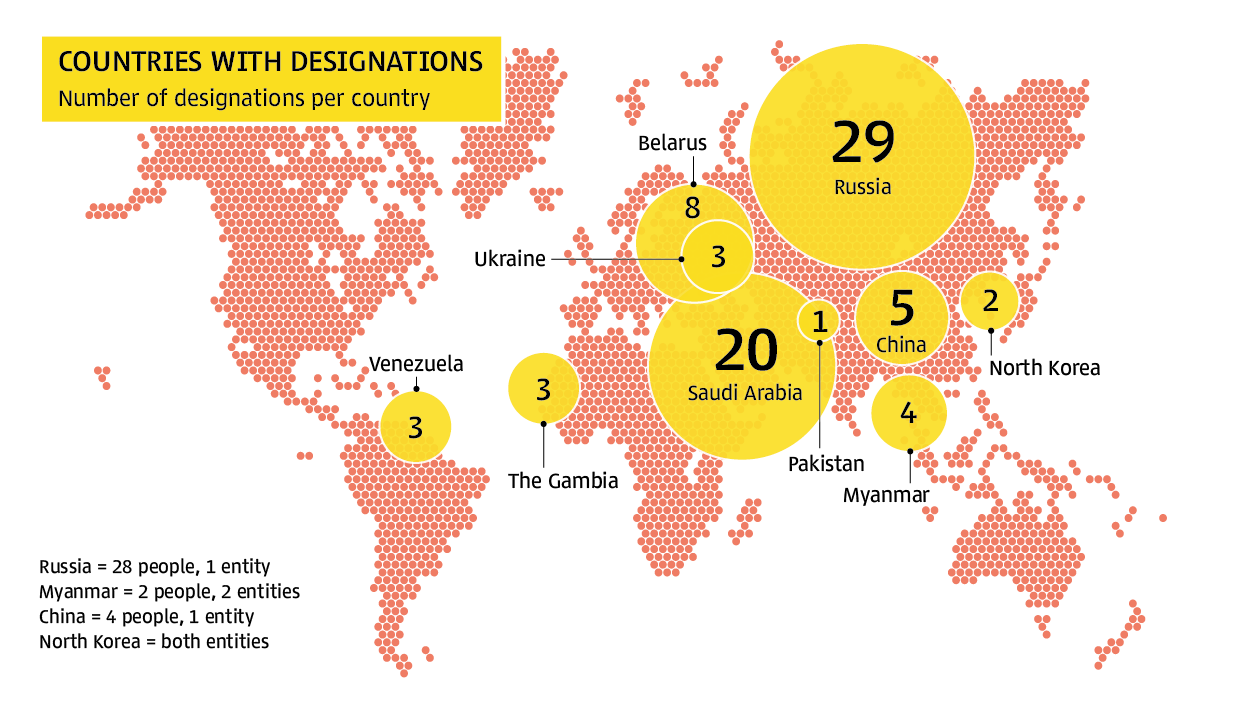
The designations covered 5 regions, 10 countries and 11 situations of human rights violations.
Russia had the most designees with 29, followed by Saudi Arabia, with 20. The Russia and Saudi Arabia designations were to some extent outliers, with a large number of designations arising from two high-profile human rights situations. 25 of Russia’s 29 designations arose from Sergei Magnitsky’s mistreatment and death. All of Saudi Arabia’s 20 designees were sanctioned for involvement in Jamal Khashoggi’s death.
The remaining 33 designations covered 9 situations of human rights violations, averaging 3.7 designations per human rights situation. The 9 situations were:
- the Rohingya crisis in Myanmar;
- torture of the Uyghur population in China;
- violence against protestors and journalists in Belarus;
- extrajudicial killings and torture during the Jammeh presidency in The Gambia;
- police encounter deaths in Pakistan;
- persecution of the LGBT community in Chechnya, Russia;
- extrajudicial killings and torture in Venezuela;
- violence against protestors in Ukraine; and
- murder, torture and slavery in prison camps in North Korea.
Which roles and seniority levels were designated?
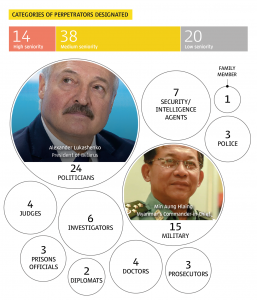
The roles of those designated were wide-ranging. The most common designees were military officials (15) – such as Min Aung Hlaing, Commander-in Chief of Myanmar’s Armed Forces – and politicians (24), including two current or former heads of state – such as President Alexander Lukashenko of Belarus.
Less common roles included one family member: the former First Lady of Gambia, Zineb Jammeh, was sanctioned for her association with former President Yahya Jammeh and covering up the illicit transfer of funds. Three doctors were sanctioned for their role in Sergei Magnitsky’s mistreatment, including failure to provide adequate medical care. And a Prosecutor-General in Ukraine was sanctioned for his office’s failure to adequately investigate torture and illegal use of force by Ukrainian law enforcement.
While the FCDO noted in its policy paper on designations, that it is ‘likely to give particular attention to non-state actors’, all Global Human Rights Sanctions designations in the first year related to violations by state officials.
In the same policy paper, the FCDO lists ‘the status and connections of the involved person’ as a relevant factor in determining who to designate. Of the individuals designated, 14 were high seniority, 38 were medium seniority, and 20 were low seniority.
Over half the mid-level and all the low-level designees were in the Magnitsky and Khashoggi tranches. Outside of the Magnitsky and Khashoggi traches there were 12 high-level, 15 mid-level, and no low-level individuals designated.
Which rights were violated?
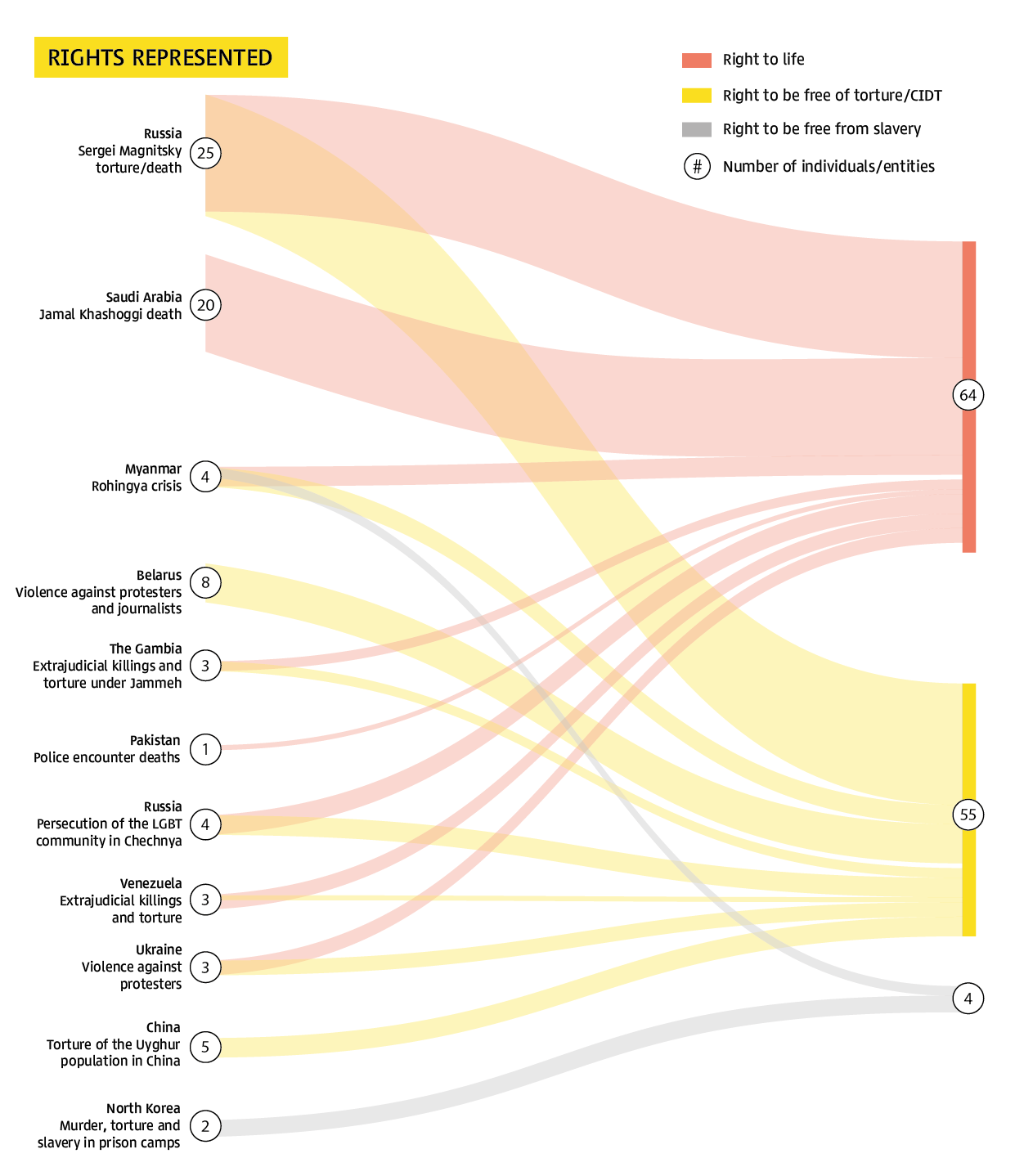
The FCDO can designate under the Global Human Rights Sanctions regime for violations of three rights: (a) the right to life; (b) the right to be free from torture and cruel, inhuman or degrading treatment (CIDT); and (c) the right to be free from slavery and forced labour.
Of the 11 human rights situations represented and the 78 individuals or entities designated, there was a heavy skew towards those that implicated the right to life and the right to be free from torture/CIDT. Slightly more individuals/entities were implicated under the right to life (59 individuals and 5 entities) as opposed to the right to be free from torture/CIDT (49 individuals and 6 entities). Only 4 designations (2 individuals and 2 entities) were for violations of the right to be free from slavery and forced labour.
Looking forward
Key questions for the second year of the UK’s Global Human Rights Sanctions regime include: will the momentum of the first year be maintained, and built on now that the UK regime has made up for lost time? How will the parallel anti-corruption sanctions regime, launched in April 2021, fare?
There are also larger questions about the regime’s wider impact. Will the sanctions have their desired effect in ending ongoing violations and deterring future abuses? How will the UK Government respond if arbitrary counter-sanctions, already imposed by China, are adopted by other countries? Will international coordination increase as mooted new regimes in Japan, Australia and elsewhere come online? And what impact will the UK’s desire to strike trade deals around the world have on its willingness to deploy sanctions? The next 12 months will provide a more accurate picture of the UK’s sanctions ambition.
Further information
This analysis forms part of REDRESS’s wider programme of work on using Magnitsky Sanctions to prevent and provide accountability for human rights abuses and corruption. REDRESS (i) builds evidence to ensure perpetrators are sanctioned; (ii) supports global civil society in engaging with UK sanctions mechanisms; and (iii) conducts policy analysis to promote the effective use of sanctions. For more information, please contact Leanna Burnard, Legal Advisor ([email protected]) and Natalie Lucas, Legal Officer ([email protected]).
* A version of this analysis has been published by RUSI.
